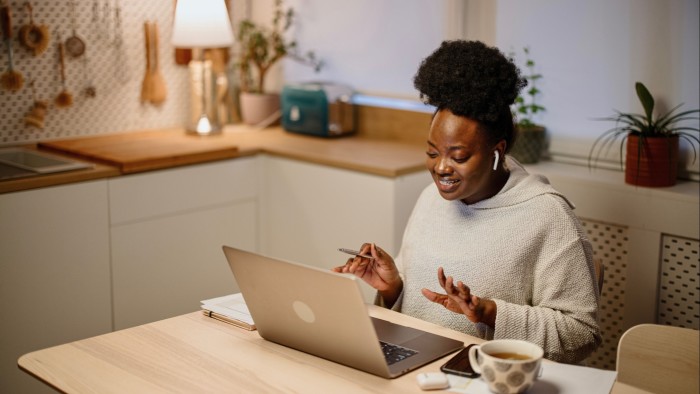Why hybrid working is a ‘game changer’ after maternity leave

Roula Khalaf, Editor of the FT, selects her favourite stories in this weekly newsletter.
One of the biggest changes in parental leave in recent years may have been for fathers — and, by implication, their partners. Extended — and paid — paternity leave has become a focus for big employers, such as Morgan Stanley, the bank, and law firm Allen & Overy, among others. Fathers can bond with their children and take pressure off mothers, and some argue that paternity leave could potentially reduce gender discrimination in the workplace.
For new mothers, too, there have been changes. More employers offer return-to-work coaching, such as Aviva, the insurer — or buddying programmes, such as at Linklaters law firm.
But perhaps the most profound change for new mothers has been brought about by changing work patterns, particularly hybrid working, which splits work time between home and office. This flexibility has the potential to affect maternity leave, and to ease the transition back to work.
Stacy Keen, a partner at law firm Pinsent Masons in London, was struck by the difference between returning from her leave after her second child, now three years old, and her first, who is six. Back then, she had one day a week working from home written into her contract. This time, hybrid is an expectation, and she spends half her working week in the office. “There is a greater flexibility,” she concludes.
Yet it would be wrong to take maternity leave and rights for granted. Maternity discrimination is still prevalent. Lauren Fabianski, head of campaigns and communications at Pregnant Then Screwed, says women regularly contact the advocacy group to say “employers do not respect maternity leave . . . [or] pregnant women”. Some even tell of managers’ hints that they should have an abortion.
A frequent complaint to the group is that working arrangements are changed unexpectedly when women return from parental leave, with some managers insisting on full-time office working.
One woman told of being made to travel to the office, where she worked online anyway. “It felt like they didn’t want me to come back,” she says — and, in the end, she left.
Other women, however, have had more positive experiences. We spoke to three about recently returning to work after maternity leave, and what they think works.
JADE EVA

Eva returned from six months maternity leave this year, and her husband, a truck driver, has taken six months shared parental leave.
“It was important for me that my husband got responsibility for looking after our child. He realises how difficult it was. Friends say their partners don’t get it.” His paternity leave was an opportunity for daughter and dad to bond as well as saving nursery fees.
Hybrid work helped Eva, head of engagement projects at professional services firm Deloitte in the UK, to make the transition from leave to work.
The days at home meant she could continue to breastfeed — she can express milk and store it when she is in the office.
Less commuting time meant more time with her husband and daughter. If she had a bad night with the baby, she knew she could adjust the times of her working day.
At the same time, she says, the days in the office helped foster connections with colleagues and focus purely on contacts.
A Deloitte return-to-work coach helped. “Some of the tips were about being open — don’t always hide that you might not have slept well.”
KIRSTEN CARMICHAEL

After a difficult pregnancy followed by medical complications, Carmichael, a shared platform security specialist at Aviva, the insurer, started her maternity leave early. “My manager went above and beyond what I expected,” she says. “He was always pinging me to check I was OK.” Following the birth, he would check on her family’s wellbeing: “I felt valued.”
Carmichael, pictured above with Pickle, a “hearing dog”, is profoundly deaf and has joined a carers community at work, and also met other colleagues who are hearing-impaired and have young children. “We’re all going through the same journey, we’re trying to learn.”
The return to work last year was hard, Carmichael says, because she was figuring out her new identity as a working parent. “I didn’t know where I fitted in. You’ve got to work out where ‘mum me’ ends and ‘work me’ starts” — it is a “balancing act”. Support from a manager and part-time office working helped make the shift, she adds.
LAURIE OLLIVENT

Ollivent, a senior associate in the employment and incentives practice at law firm Linklaters, returned to work from her first maternity leave when most people were working from home because of Covid. “It was jarring sitting amid baby toys, suddenly going from ‘mum’ to ‘work’,” she recalls. “Adjusting to that mindset was very hard when you’re not leaving the house.”
But returning to the office for part of the week, three months ago, after her second leave, was a “game changer”, she says. “A lot can change — having some time in the office made a difference.” She also preferred doing her ‘keeping-in-touch time’ in person.
She and her husband live far away from their relatives and the immediate support they might offer. “None of our family is here,” she says. “Without hybrid, I don’t know how I would have done it.”
Her husband also took parental leave, and their shared challenges of returning to work are important: “For him to appreciate that is very good for the dynamic of the family.”
She values the Linklaters buddy scheme, which matches up employees going on parental leave. “In both cases, it was people who I hadn’t worked with before. You’re suddenly bonding over something personal.”
One perk that helped was a period of “adjustment days”, to ease the transition from family leave to work. “It’s really good for retention if you feel you’ve been supported in one of the hardest parts of your career.”
Comments